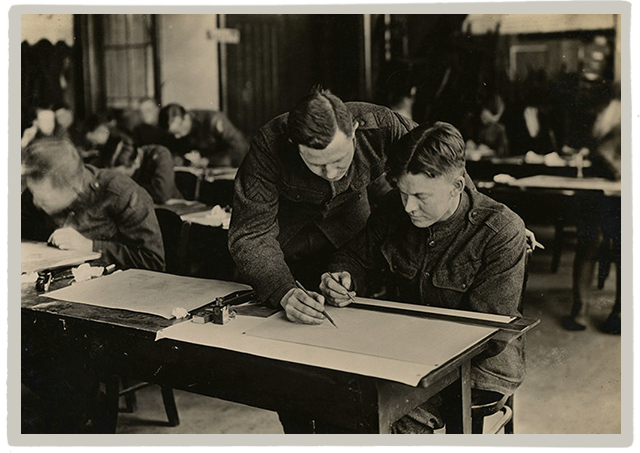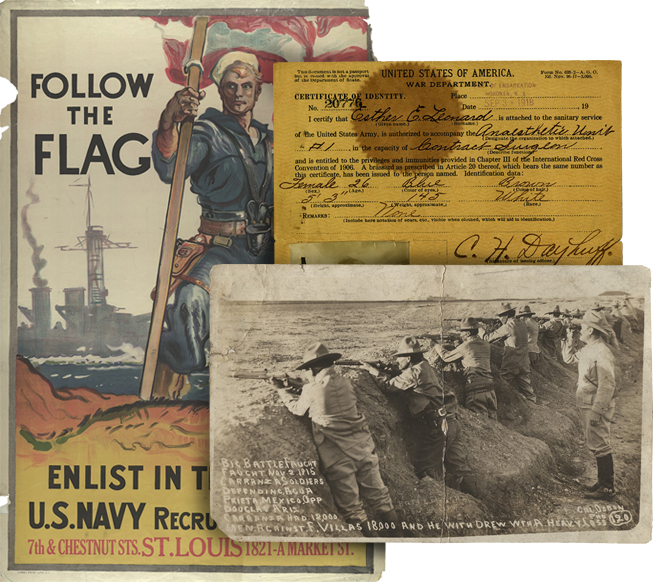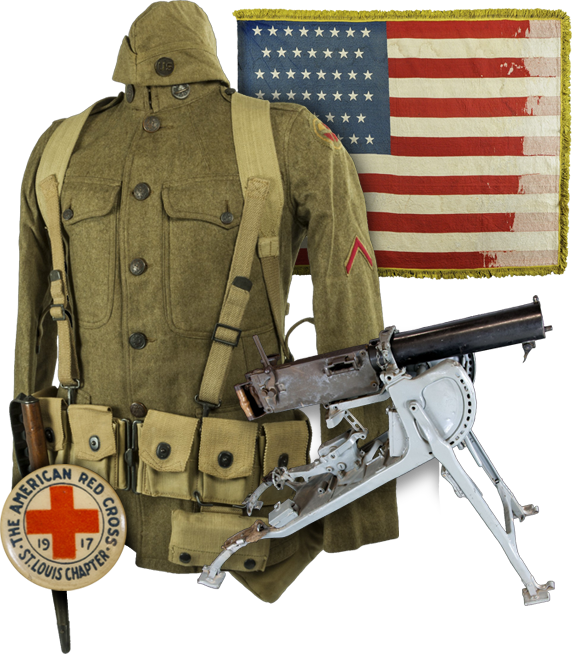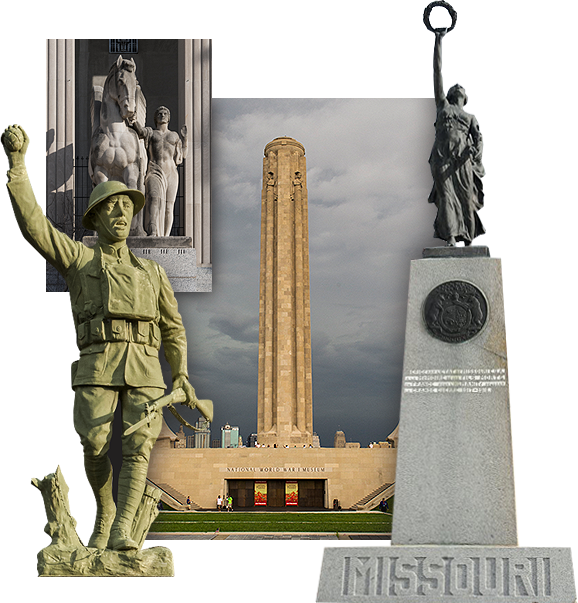Letter from Newton D. Baker to the Governor of New York - April 23, 1917

Transcript
Registration of Young Men for national defence. Letter S. of W. to Governors. 34-440 6-070 April 23, 1917 The Honorable Governor of New York, Albany, N.Y. [New York] My dear Governor: The President desires that I bring to your attention the following considerations which he is not at present ready to give to the press: Pending legislation contemplates calling to the colors a sufficient number of young men to provide for the common defence. It will be apparent to you that no steps can be taken toward the actual mustering of a selected army until, in the form of a registration of all males of designated age, there has been completed a most comprehensive census of our resource of men. Notwithstanding difference of opinion that may exist as to other features of this legislation, no voice has yet contested the necessity for such an enrollment and we may confidently assume that the law will carry a provision requiring all such persons to present themselves for registration at a day and place to be named by Presidential proclamation, under pain of penalty for failure to do so. While enrollment is thus necessary, the undertaking it imposes is very great. The machinery for such a census must first be created. In the Civil War a period of two and one-half months of preparation was necessary before a single name could be written in the rolls of available men. The prospect of such delay is disturbing. At the moment of the enactment of a law levying new armies, there will be a wide demand for instant action, yet the enthusiasm and the potential energy of our people must remain pent and poised while we await the completion of the uninspiring and tedious preliminary of enrollment. If this delay can be avoided it must be avoided. Intrinsic in the problem that confronted Congress in 1863, was the necessity for creating a complete federal instrumentality for effecting the registration. The states, unhappily, were not at one in bearing out the nation in this. When we afford ourselves the satisfaction of saying that this condition no longer subsists we put the chief impediment to swift action out of our reckoning. The gratifying and evident eagerness of the states to do their utmost in aid of the Nation at this emergent moment persuades us to indulge the belief not only that sate agencies can be used for this purpose, but that they promise the swiftest and the most effective possible execution of the law. It is not too sanguine, I think, to say that this consideration breaks our way directly to the light and insures the resolution of all our difficulties. As an incident of elections, and in those elections themselves,

Transcript
our people have long been practiced in presenting themselves at accustomed voting places to be called for one purpose or another by the agencies of the states. The methods employed in those enumerations are admirably adapted to the accomplishment of this, for we find in every state a mechanism for registration and a people accustomed to its use. The details of the local instrumentalities may differ, but all exist for a single purpose that is, in essential substance, the purpose we now entertain. It is true that these agencies are not at present bound in a single uniform system responsive to a sole control, but the elimination of this objection is precisely our problem. I cannot think that it is difficult. The pending bill contains the following provision which I confidently believe will become law:

Transcript
by draft, the law is careful to provide for avoiding the misery that war brings to dependents at home and for a choice of those whose military service the nation most needs and whose civil and domestic service can best be spared. The important duty of making the selection from the drafted class can best be performed by a permanent board in each county composed of citizens who can be relied upon to exercise this solemn function with even justice and with apprehension of its gravity. This board should control the process of selection from its earliest steps, and therefore it must supervise the registration. For the sake of uniformity, for the elimination of expense, and for further and self-evident considerations, it would be prescribed that this board be composed of the sheriff, who would act as its executive officer, the county clerk, who would be the custodian of its records, and the county physician, who would serve as surgeon and pass upon the physical fitness of those who are selected for service. In the normal case the board must be so constituted, but county organization is not uniform throughout the nation, and, important as is the requirement of homogeneity in the general pattern, it is not desired to restrict the discretion of governors in adapting the essentials of the plan to the peculiarities of local political institutions, in so far as that may be done without impairing the function of the national machine. Cities of over 30,000 inhabitants present a special case; while urban voting precincts are as well adapted to registration as those in rural districts, the supervisory county board is not suited to the municipal organization of cities of so great a population. It is thought that, for the execution of the law in such cities, boards similar to the county board should be constituted for one or more wards to supervise the registration in indicated precincts and to further execute the law, and that the various ward boards should function under a central city board of control. While the territorial organizations here described must be preserved and the pattern of county and city control must not be disturbed, there shall not be laid down any inflexible rule governing the composition of these local boards and that matter shall be left to our good judgment. You will realize, however, that the maintenance of the suppleness and efficiency of the whole system requires that the least possible departure be made in the constitution of these boards and that considerations arising from local peculiarities should be strong indeed to induce a change in the normal constitution here indicated. It would be gratifying also to think that the services required of members of these boards would be offered without hope of compensation, but it is borne in mind that the duties imposed upon them will be exacting, difficult, and frequently distressing. If compensation is necessary, the Government stands ready to make it. Where any service in connection herewith is rendered gratuitously the government will be prompt to express its appreciation. The next though in coordinating local organizations under a central control indicates yourself as chief executive of the State, functioning, of course, through some appropriate office that will relieve you of detail. The office that suggests itself instantly to my mind is that of your Adjutant General. The President has the firmest confidence that in the execution of this law of devoted sacrifice by the people themselves our genius for self- 3

Transcript
government will transcend all prior expressions. For this reason it is desired to make the point of actual application of the law non-military, but, as the system centralizes, its military objects is emphasized, and with the assistance of such clerical force as may be necessary, your Adjutant General

Transcript
counties since the last census (upon which we shall rely in distributing blanks) we shall forward to you a surplus to fill deficiencies in county supplies and your sheriff should be instructed to telegraph state headquarters in case of shortage. The hope is entertained that the whole system may be ready to proceed to registration within ten days (or, at most, two weeks) after enactment of the law, but confidence in this is reserved until advices have been received from the governors apprising of difficulties (if such there be)which have not been foreseen in this rather hasty survey of the political systems of the Statew. It is of course apparent that the success of this great undertaking is dependent entirely upon the zeal and cooperation of state, city, and county officials, and of private citizens. It will require the very best efforts of everyone concerned in it. Such a complete reliance on state organization for the performance of a Federal service has never before been made in our history, and it is a happy day for the Union when it can be said, as it now can be said, that the very best means that could possibly be employed for such a necessary and emergent national task are the political organizations of the several states. Very respectfully, Newton D. Baker Secretary of War. [Handwritten] Similar letter to the Gov. of each state & the Commissioner of the D. of C.
Details
| Title | Letter from Newton D. Baker to the Governor of New York - April 23, 1917 |
| Creator | Baker, Newton D. |
| Source | Baker, Newton D. Letter to the Governor of New York . 23 April 1917. Crowder, Enoch H. (1859-1932), Papers, 1884-1942. C1046. The State Historical Society of Missouri, Columbia, MO. |
| Description | In this letter to the Governor of New York, Secretary of War Newton D. Baker informed the governor how to proceed with the process of registration in the state, assuming that the Selective Service Act passed. This letter is part of a collection compiled by Enoch Herbert Crowder, the Edinburg, Grundy County, Missouri native who served as Judge Advocate General. Crowder devised the Selective Service Act in 1917 which drafted America's forces during World War I. |
| Subject LCSH | Crowder, E. H. (Enoch Herbert), 1859-1932; United States. Army--Recruiting, enlistment, etc.-- World War, 1914-1918; Draft; United States. War Department |
| Subject Local | WWI; World War I; Selective Service Act of 1917 |
| Site Accession Number | C1046 |
| Contributing Institution | The State Historical Society of Missouri |
| Copy Request | Transmission or reproduction of items on these pages beyond that allowed by fair use requires the written permission of the State Historical Society of Missouri: 1020 Lowry Street, Columbia, Missouri, 65201-7298. (573) 882-7083. |
| Rights | The text and images contained in this collection are intended for research and educational use only. Duplication of any of these images for commercial use without express written consent is expressly prohibited. |
| Date Original | April 23, 1917 |
| Language | English |



